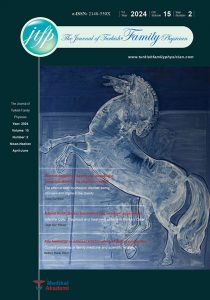Evaluation of The Attitudes of Physicians Towards Patients with Mental Disorders
Introductıon and Aim: Stigmatic attitudes and behaviors of physicians towards patients with mental disorders adversely affect the treatment processes and social lives of individuals. The aim of this study was to evaluate the attitudes of physicians working in a public hospital towards patients with mental disorders, to reveal the factors affecting this attitude and to analyze the changes according to departments.
Materials and Methods: This descriptive study was conducted on physicians and as a data collection tool, the Opinions Opinions Mental Illness Scale-OMI scale was used in addition to the introductory information form developed in the literature. Increasing scores in the assessment of the scale consisting of five sub-dimensions of protection, authoritarianism, mental he-alth ideology, social restrictiveness and interpersonal etiology mean that stigmatization has increased. Surveys were distributed and collected to 213 of 570 physicians from 20 different parts of the universe.
Results: A total of 213 people from 20 departments inclu-ding 9 surgeries, 10 internal and 1 basic medicine departments participated in this study. 51% of our participants were female (n = 109) and 49% were male (n = 104). Accordind to results of Opinions on Mental Patients and their Diseases Scale, there was a meaningful relationship in the field of mental health ideology when viewed by gender (p=0.015). No significant relationship was found when viewed by age. In the field of Protection and caregiving depertment of psichiatry(55), in the field of authoritarianism departments of general surgery (56), in the field of mental health ideology departments of neurosurgery (32), in social constraints department of neurosurgery (41), in the field of interpersonal etiology, chest diseases and psychiatry departments (31 and 28, respectively) was found to have the highest scores.
Conclusion: It was concluded that the physicians in the psychiatry department performed more stigmatization than the other physicians in general.
References
- What is the WHO definition of health? https://www.who.int/about/who-we-are/frequently-asked-questions adresinden 07.08.2019 tarihinde erişilmiştir.
- Öztürk MO: Ruh sağlığı ve bozukluğunun tanımlanması. “Ruh Sağlığı ve Bozuklukları” içinde. (Ed) Öztürk O. 7. Basım. Ankara, Hekimler Yayın Birliği 1997: 101-4.
- Mental disorders affect one in four people. https://www.who.int/whr/2001/media_centre/press_release/en/ adresinden 10.05.2019 tarihinde erişilmiştir.
- Erol N, Kılıç C, Ulusoy M. Türkiye Ruh Sağlığı Profili Raporu. Ankara, Eksen Tanıtım Ltd.Şti. 1998.
- Küey L, Üstün BT, Güleç C. Türkiye’de ruhsal bozukluklar epidemiyolojisi araştırmaları üzerine bir gözden geçirme çalışması. Toplum ve Hekim 1987;44:16-30.
- Toft T, Fink P, Ornbol E, Christensen K, Frostholm l, Olesen F. Mental disorders in primary care: prevalence and co-morbidity among disorders: Results from the functional illness in primary care (FIP) study. Psychol Med 2005; 8:1175-84.
- Keskin A. ve ark. Ruhsal bozuklukların yaygınlığı, cinsiyetlere göre dağılımı ve psikiyatrik destek alma ile ilişkisi. Nöropsikiyatri Arşivi 2013; 50: 344-51.
- Sayar K. Her toplumun stigması farklıdır. Popüler Psikiyatri Dergisi 2002, 9: 18-23.
- Taşkın EO. Ruhsal hastalıklarda damgalama ve ayrımcılık. “Stigma ruhsal hastalıklara yönelik tutumlar ve damgalama” içinde. (ed)Taşkın EO. İzmir, Meta Basım ve Matbaacılık, 2007:17-30.
- Corrigan P. How stigma interferes with mental health care. American Psychological Association 2004; 59(7): 614 – 25. DOI: 10.1037/0003-066X.59.7.614
- Crisp, Arthur H., et al. Stigmatization o people with mental illnesses. The British Journal of psychiatry 2000; 177(1): 4-7.
- Phelan JC. Psychiatric illness and family stigma. Schizophr Bull 1998; 24(1):115-26.
- Link BG, et al: On stigma and its consequences: evidence from a longitudinal study of men with dual diagnoses of mental illness and substance abuse. J Health Soc Behavoir 1997;38(1):177-90,
- Mental Health. A Call for Action by World Health Ministers. https://www.who.int/mental_health/media/en /249.pdf adresinden 06.08.2019 tarihinde erişilmiştir.
- Jorm AF, Korten AE, Jacom PA, Christensen H, Henderson S: Attitudes towards people with a mental disorder: a survey of Australian public and health professionals. Aust N Z J Psychiatry 1999; 33:77-83.
- Özmen E ve ark. Psikiyatri dışı uzman hekimlerin ruhsal bozukluklar konusunda bilgi ve tutumları. Anadolu Psikiyatri Dergisi 2003; 4:5-12.
- Işık S. Psikiyatri ve psikiyatri dışı kliniklerde çalışan hekim ve hemşirelerin ruh sağlığı bozuk bireylere ilişkin görüşleri. Psikiyatri Hemşireliği Yüksek Lisans Tezi. İzmir, 2010. DEÜ.HSI. MSc.2003970047
- Bağ B. Sağlık personelinin ruhsal sorunları olan bireylere yönelik tutumlarının araştırılması. Elektronik Sosyal Bilimler Dergisi 2005; 3(11):107-27. URL: http:// www.e-sosder.com.
- Çamkuşu B. Zonguldak il merkezinde yaşayan bireylerin ruh hastalıklarına karşı tutumları. Hacettepe Üniversitesi Sağlık Bilimleri Enstitüsü Bilim Uzmanlığı Tezi. Ankara, 1997.
- Nordt C, Rossler W. and Lauber C. Attitudes of Mental Health Professionals toward People with Schizophrenia and Major Depression. Schizophrenia Bulletin 2006; 32: 709-14. https://doi.org/10.1093/schbul/sbj065



